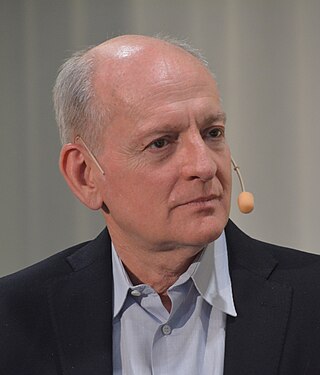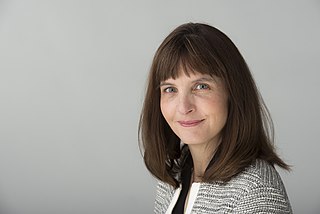Related Research Articles

The University of Alberta is a public research university located in Edmonton, Alberta, Canada. It was founded in 1908 by Alexander Cameron Rutherford, the first premier of Alberta, and Henry Marshall Tory, the university's first president. It was enabled through the Post-secondary Learning Act. The university is considered a "comprehensive academic and research university" (CARU), which means that it offers a range of academic and professional programs that generally lead to undergraduate and graduate level credentials.

Jonathan Herbert Schaeffer is a Canadian researcher and professor at the University of Alberta and the former Canada Research Chair in Artificial Intelligence.

Stuart Jonathan Russell is a British computer scientist known for his contributions to artificial intelligence (AI). He is a professor of computer science at the University of California, Berkeley and was from 2008 to 2011 an adjunct professor of neurological surgery at the University of California, San Francisco. He holds the Smith-Zadeh Chair in Engineering at University of California, Berkeley. He founded and leads the Center for Human-Compatible Artificial Intelligence (CHAI) at UC Berkeley. Russell is the co-author with Peter Norvig of the authoritative textbook of the field of AI: Artificial Intelligence: A Modern Approach used in more than 1,500 universities in 135 countries.
Vasant G. Honavar is an Indian-American computer scientist, and artificial intelligence, machine learning, big data, data science, causal inference, knowledge representation, bioinformatics and health informatics researcher and professor.
Alan Mackworth is a professor emeritus in the Department of Computer Science at the University of British Columbia. He is known as "The Founding Father" of RoboCup. He is a former president of the Association for the Advancement of Artificial Intelligence (AAAI) and former Canada Research Chair in Artificial Intelligence from 2001 to 2014.

Richard S. Sutton is a Canadian computer scientist. He is a professor of computing science at the University of Alberta and a research scientist at Keen Technologies. Sutton is considered one of the founders of modern computational reinforcement learning, having several significant contributions to the field, including temporal difference learning and policy gradient methods.

Manuela Maria Veloso is the Head of J.P. Morgan AI Research & Herbert A. Simon University Professor Emeritus in the School of Computer Science at Carnegie Mellon University, where she was previously Head of the Machine Learning Department. She served as president of Association for the Advancement of Artificial Intelligence (AAAI) until 2014, and the co-founder and a Past President of the RoboCup Federation. She is a fellow of AAAI, Institute of Electrical and Electronics Engineers (IEEE), American Association for the Advancement of Science (AAAS), and Association for Computing Machinery (ACM). She is an international expert in artificial intelligence and robotics.
Informatics is the study of computational systems. According to the ACM Europe Council and Informatics Europe, informatics is synonymous with computer science and computing as a profession, in which the central notion is transformation of information. In some cases, the term "informatics" may also be used with different meanings, e.g. in the context of social computing, or in context of library science.
The Department of Computer Science at the University of British Columbia was established in May 1968. UBC CS is located at the UBC Point Grey campus in Vancouver, British Columbia, Canada. As of November 2023, it has 66 faculty, 64 staff, 259 graduate students, and 2,774 undergraduates.

Osmar R. Zaiane is a researcher, computer scientist, professor at the University of Alberta specializing in data mining and machine learning. He was the secretary treasurer of the Association for Computing Machinery (ACM) Special Interest Group on Knowledge Discovery and Data Mining (SIGKDD) from 2009 to 2012 and treasurer of the ACM Special Interest Group on Health Informatics. He served as the editor-in-chief of the SIGKDD Explorations publication from 2008 to 2010. He was also the associate editor of the same publication from 2004 to 2007.

Jason H. Moore is a translational bioinformatics scientist, biomedical informatician, and human geneticist, the Edward Rose Professor of Informatics and Director of the Institute for Biomedical Informatics at the Perelman School of Medicine at the University of Pennsylvania, where he is also Senior Associate Dean for Informatics and Director of the Division of Informatics in the Department of Biostatistics, Epidemiology, and Informatics.

Eric Poe Xing is an American computer scientist whose research spans machine learning, computational biology, and statistical methodology. Xing is founding President of the world’s first artificial intelligence university, Mohamed bin Zayed University of Artificial Intelligence (MBZUAI).
David Silver is a principal research scientist at Google DeepMind and a professor at University College London. He has led research on reinforcement learning with AlphaGo, AlphaZero and co-lead on AlphaStar.

Thomas G. Dietterich is emeritus professor of computer science at Oregon State University. He is one of the pioneers of the field of machine learning. He served as executive editor of Machine Learning (journal) (1992–98) and helped co-found the Journal of Machine Learning Research. In response to the media's attention on the dangers of artificial intelligence, Dietterich has been quoted for an academic perspective to a broad range of media outlets including National Public Radio, Business Insider, Microsoft Research, CNET, and The Wall Street Journal.

Charles Lee Isbell Jr. is an American computer scientist, researcher, and educator. He is Provost and Vice Chancellor for Academic Affairs at the University of Wisconsin–Madison. Before joining the faculty there, he was a professor at the Georgia Institute of Technology College of Computing starting in 2002, and served as John P. Imlay, Jr. Dean of the College from July 2019 to July 2023. His research interests focus on machine learning and artificial intelligence, particularly interactive and human-centered AI. He has published over 100 scientific papers. In addition to his research work, Isbell has been an advocate for increasing access to and diversity in higher education.

Björn Wolfgang Schuller is a scientist of electrical engineering, information technology and computer science as well as entrepreneur. He is professor of artificial intelligence at Imperial College London., UK, and holds the chair of embedded intelligence for healthcare and wellbeing at the University of Augsburg in Germany. He was a university professor and holder of the chair of complex and intelligent systems at the University of Passau in Germany. He is also co-founder and managing director as well as the current chief scientific officer (CSO) of audEERING GmbH, Germany, as well as permanent visiting professor at the Harbin Institute of Technology in the People's Republic of China and associate of CISA at the University of Geneva in French-speaking Switzerland.
Eleni Stroulia is a Greek and Canadian computer scientist whose research concerns artificial intelligence, social computing, smart buildings, the internet of things, and software engineering for real-world applications. She is a professor of computing science at the University of Alberta, where she has been a McCalla Professor and the holder of the NSERC/AITF Industrial Research Chair in Service Systems Management.

Tania Marjorie Bubela is a professor and dean in the Faculty of Health Sciences at Simon Fraser University.

David G. Stork is a scientist and author, who has made contributions to machine learning, pattern recognition, computer vision, artificial intelligence, computational optics, image analysis of fine art, and related fields.

George K. Georgiou is a Canadian educational psychologist who is a full professor in the Department of Educational Psychology at the University of Alberta. He also directs the J.P. Das Centre on Developmental and Learning Disabilities. His research primarily addresses the prevention and treatment of reading disabilities.
References
- ↑ "Russ Greiner". aicml.ca. Retrieved December 12, 2015.
- ↑ "Past McCalla Professorship". ualberta.ca. Retrieved November 25, 2023.
- ↑ "Killam Annual Professorship". ualberta.ca. Retrieved November 25, 2023.
- ↑ "Killam Laureates". ualberta.ca. Retrieved November 25, 2023.
- ↑ Yu, Chun-Nam; Greiner, Russell; Lin, Hsiu-Chin; Baracos, Vickie (2011). "Learning patient-specific cancer survival distributions as a sequence of dependent regressors". Advances in Neural Information Processing Systems. 24. Retrieved 2024-03-26.
- ↑ Haider, Humza; Hoehn, Bret; Davis, Sarah; Greiner, Russell (2020). "Effective Ways to Build and Evaluate Individual Survival Distributions". Journal of Machine Learning Research. 21 (85): 1–63. ISSN 1533-7928 . Retrieved 2024-03-26.
- ↑ Gharari, Ali Hossein Foomani; Cooper, Michael; Greiner, Russell; Krishnan, Rahul G (2023-07-02). "Copula-based deep survival models for dependent censoring". PMLR. p. 669–680. ISSN 2640-3498 . Retrieved 2024-03-27.